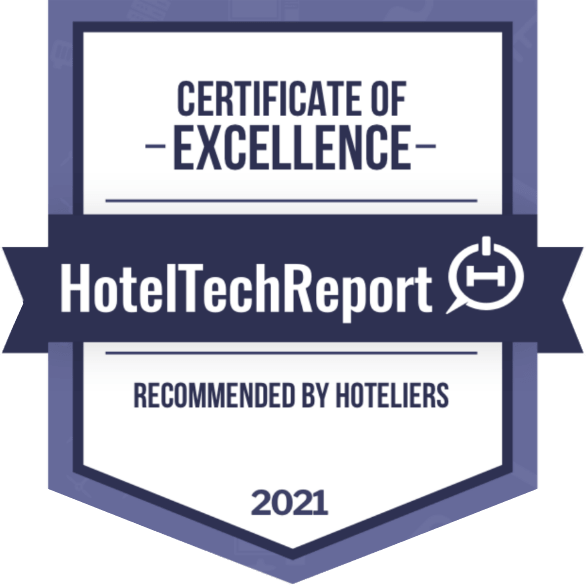Table of Contents
ToggleAs automation becomes more and more prevalent in society, it’s no surprise that it’s making its way into the hospitality industry. In today’s fast-paced digital world, hotel and motel operators must be able to keep pace with the needs of guests on an individual basis. With the use of automated hotel management system, you can streamline your processes, improve operational efficiency, enhance personalisation, improve guest satisfaction, and improve employee satisfaction.
The public has grown to expect contactless services due to the pandemic and guests’ expectations have changed forever after experiencing the convenience and consistent service that automation brings. Automated check-in and check-out kiosks, robot room service attendants and digital concierges are some of the ways that hotels are looking to cut costs and improve customer service.
While some people may be hesitant to embrace this new technology, it’s clear that automation is here to stay.
What is Hotel Automation?
Automation in hotels reduces the amount of human involvement required and helps eliminate bottlenecks. With automation, operations become more efficient and revenue increases.
Examples of automated hotel management system and motels include:
- Chatbots
- Digital check-in kiosks
- Digital folders
- Smart room technology
- Rate management
- Automated housekeeping processes
- Automated food service
Using chatbots on your website and social media accounts help you engage with customers while automating some of the more tedious parts of the sales process, like answering questions about rates or availability. This frees up time, ensuring that human agents only have to engage with customers for more in-depth inquiries.
In addition, chatbots can be useful for marketing purposes because of the huge amount of data they collect, and they allow hotels to promote special events and promotions directly to customers. The most successful chatbots are able to create enough trust between the customer and the brand that they will return again in the future. They can help hotel staff better understand the needs of their customers, and they can be programmed to provide personalised recommendations by analysing interactions with other guests, purchase history, and other factors. Another great feature they provide is real-time translation – in other words, they can answer customer questions in any language.
Digital check-in kiosks are becoming more and more common in hotels across the world. They offer a convenient way for guests to check in and receive their room key without having to go to the front desk. They allow you to scrap any registration paperwork, saving on paper and printing costs, and improving your property’s sustainability.
A digital folder can be incorporated into a hotel or motel app. Instead of providing printed information about the hotel in guest rooms, guests can access all of these details in the digital folder – details such as menu information, information on other facilities, and even the local area. Again, this reduces printing costs and lets you update the details instantly.
Smart room technology is gradually creeping into hotels and motels across the world. The main benefit of this technology is personalisation – by using sensors and Internet of Things (IoT) devices, hotels can track everything from when a guest enters their room to what they do while they’re there. This data can then be used to improve the guest’s stay by automatically adjusting things like the temperature, lighting and even the entertainment options available.
Manually establishing the optimal rate to charge guests is a laborious task. There are so many factors to consider that are continually changing. Automated rate management maximises revenue by ensuring you charge the optimal rate at any given moment. It considers factors such as supply and demand, guest loyalty, market conditions, location, and the level of competition.
Hotel housekeeping management systems work by tracking the status of each room in the hotel. This can include whether the room is occupied, what type of cleaning it needs, and when the last cleaning was done. This information can help housekeeping staff plan their time more effectively and ensure that all rooms are clean and ready for guests. Having a digital way of tracking housekeeping information ensures that information is recorded and staff don’t have to rely on phone calls or written notes.
Just one example of how housekeeping can benefit is the review of the Crowne Plaza Changi Airport which saw a 40% reduction in time taken to carry out cleaning tasks, as well as an overall improvement in cleanliness.
Hotels are increasingly using automation in restaurants to improve the speed and accuracy of food delivery to guests. This can include things like self-service kiosks, or using an app to order food to their rooms or to their table in the restaurant. This allows hotels to serve more guests faster and with fewer errors. Using a Cloud based system allows you to start providing a range of automated restaurant services, preventing your staff from getting overwhelmed during busy periods and offering customers the ultimate flexibility.
Automating the Guest Journey with Apps
As the market for travel apps continues to grow, more and more hotels are choosing to integrate apps into their operations to attract new customers and improve customer satisfaction. Through an app, guests can book and manage their stay, check in and out of the property, leave reviews, and access hotel information via a digital folder, as well as access Wi-Fi and communicate with staff.
Apps can also be used to promote the hotel, including offering discounts and other incentives and ultimately, improve customer retention. They can help guests feel more comfortable staying at a particular hotel because they know that everything will be taken care of for them.
Keyless entry is also possible through an app. Using cryptographic technology, guests are able to use digital keys to gain access to their rooms. If they don’t want to use keyless check-in, they still have the option of visiting the check-in kiosk. (However, an overwhelming majority of guests in 2020 said they preferred to).
Automated Hotel and Motel Management Systems

Hotel automation systems are not a new concept, but the designs and capabilities have evolved over the years. Property Management Systems (PMSs) laid the foundations for automation in hotels, allowing you to reduce the human involvement for various process. Some key components of these systems are booking engines, channel managers, guest service tools such as chatbots, and revenue management tools.
The booking engine is what allows customers to book rooms and other facilities in a hotel online. It is usually integrated into a hotel’s website, and allows customers to see what rooms are available, make reservations, and pay for their stay.
A channel manager helps manage room inventory and rates across multiple online channels. It can also help automate the booking process and send confirmations and updates to guests. A channel manager works by connecting a hotel’s PMS with other systems used by travel agents and online booking channels. This allows the hotel to update rates and availability, and track bookings made through those channels. It saves a lot of time and effort and ensures that rates and availability are accurately updated across all channels, preventing overbookings and other problems. All in all, a channel manager is a crucial asset to any hotel that’s looking to expand their online presence and in the future, more and more features will be integrated into these PMSs as technology advances.
Our channel manager, StayFull, comes with the roomMaster Anywhere PMS. It connects with more than 155 Online Travel Agents including Expedia, Booking.com, and AirB&B, letting you get the most out of your property. It synchronises availability across all channels in real-time and automatically updates when bookings are changed or cancelled. The analytics features lets you collect performance data and provides insights into which partnerships are the most valuable for your business.
To sum up, the benefits of automation in hotels and motels are:
- Improved customer service
- Reduced guest wait times
- Improved guest satisfaction
- Improved employee satisfaction
- Reduced costs (wages and training)
- Improved operational efficiency, remove bottlenecks
- Consistency of service
- Save paper and printing costs, improving sustainability
- Increased revenue
Automated hotel management systems are more efficient and accurate than human staff, meaning that customers will get their rooms faster and without any mistakes. It also provides consistent service – computers won’t be friendly today then get into arguments with guests tomorrow. By automating basic tasks such as checking in and out, hotels and motels can free up staff members to provide more personalised service to guests.
Conclusion
The future of automation in the hotel and motel industry is bright. As more and more hotels adopt automation technology, guests will come to expect amenities such as the options to check in and out quickly and easily, order food and drinks without having to speak to anyone, and get help from a virtual assistant 24/7 are now.
Automation will help reduce labour costs for hotels and improve customer service across the board – vital factors to keep in mind during the current economic climate. Automation is about improving all aspects of your hotel, which all ultimately impact guest experience, directly (through the examples above) or indirectly (by improving operations and employee satisfaction, which always impacts guests).
roomMaster Anywhere is an easy to use, all-in-one, pure cloud reservations software solution for hotels, motels, and guesthouses. It’s ideal for small and medium properties (or group properties) needing a pure cloud PMS, with a highly intuitive user interface with powerful rate and customer management tools. Many optional add on features are available and the PMS can be used from ANY device from desktops & laptops to smart devices. This next generation technology which is constantly evolving includes:
- Configurable booking chart with drag/drop functionality
- Group bookings with online group portals for easier management
- Auto pre and post stay emails and full guest communications
- Powerful rates management with flexible change options
- Digital Guest Registration with the ability to store identification documents
- Seamless connectivity with POS systems like H&L
- Multiple payment gateway options for easy in app payment processing
- An in-built channel manager (it can also be connected to other popular channel managers)
- A delightfully easy Book Now button



